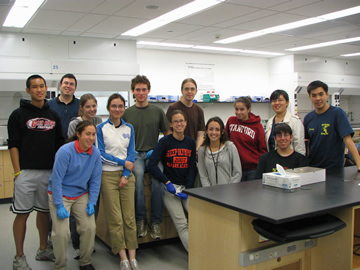 |
New Jersey Governor's School in the Sciences at Drew University |
 |
Drew Links |
|
| Team Projects | |
| NJGSS Home | |
| About NJGSS | |
Related Links |
|
| Drew University | |
2007 Team 2 |
||||||||
PHOSPHONIC ACID: A ZERO-ENERGY APPROACH TO TEFLON REPLACEMENT Tom Appicella, Daphne Ezer, Brianna Fram, Dominique Ingato, Sarah Karinja, Marina Mainescu, Vincent Ning, Lucas Pratt, Alec Story, Sally Wang, Olivia Waring Advisors: Michael Avaltroni |
||||||||
ABSTRACTOctadecylphosphonic Acid (ODPA) is a hydrophobic substance that may be applied to any oxide surface – such as a metal or glass - to create an organic, hydrophobic non-stick coating similar to that of Teflon (Polytetrafluoroethylene). However, ODPA coatings covalently bond to the surface of oxides rather than physically sticking to a surface as Teflon does. As a result, ODPA suffers none of the drawbacks of Teflon, including erosion or chipping of the surface (as in non-stick cookware), “creep” of the Teflon coating along a surface, and the carcinogenic qualities of the fluorinated Teflon molecule. Our goal was to create a method of applying this coating for production outside a laboratory, with a particular focus on low- to zero-energy methods to further entice industry. We found that by using a Meyer rod to apply ODPA and allowing it to cure in a greenhouse on top of aluminum or galvanized steel, we could create coatings comparable to traditional, energy-intensive methods. |
||||||||
|
||||||||
For additional information contact NJGSS at 973-408-3605 or mpapier@drew.edu
